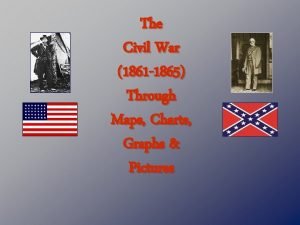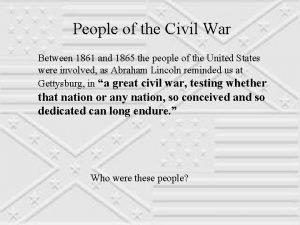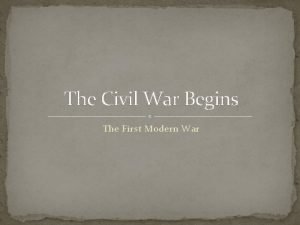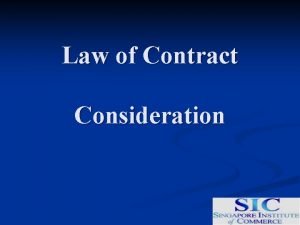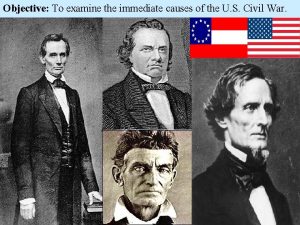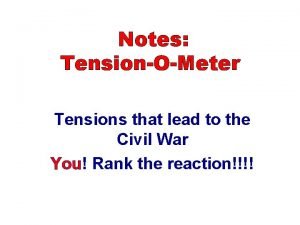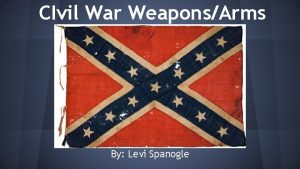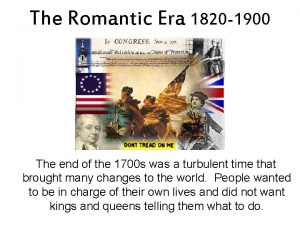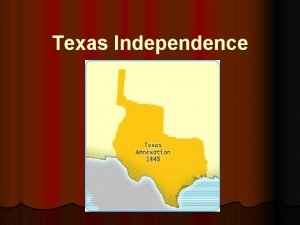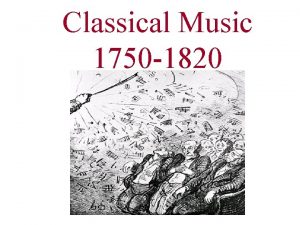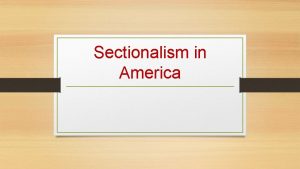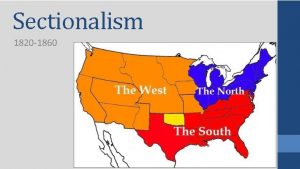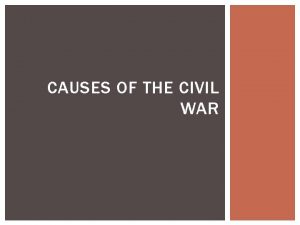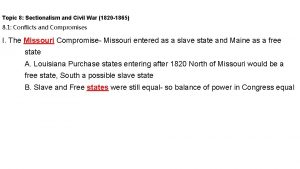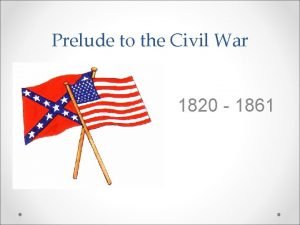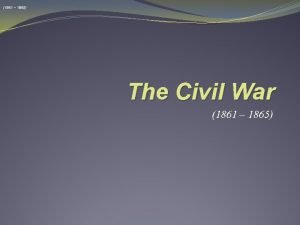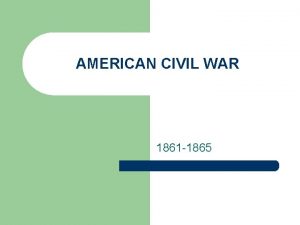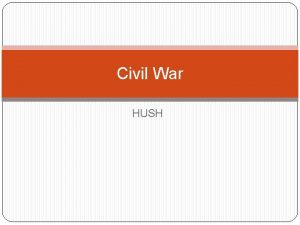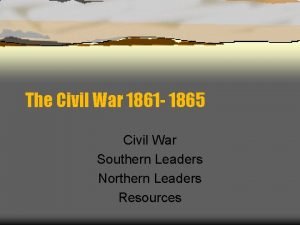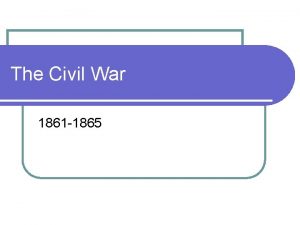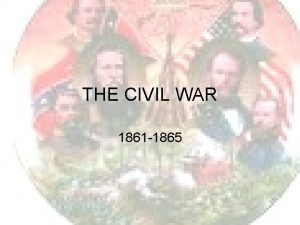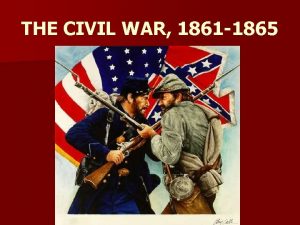Road to Civil War 1820 1861 Sectionalism An






















- Slides: 22

Road to Civil War 1820 -1861

Sectionalism • An exaggerated loyalty to a particular region of the country • Distinct division are formed – Beliefs – Policies • 1819 – there is a balance of “free” and “slave” states – Missouri (“slave” state) asks for admission into the US.

Missouri Compromise • Henry Clay’s proposal – To keep the balance, Missouri admitted as “slave” and Maine as a “free” state – All future states below the 36 degree parallel would be “slave” states • Compromise worked for next 25 years…

Great Race… • 1840 s, New territories are growing – Texas won Independence from Mexico – US Mexican war would free other territories (California & New Mexico) – Oregon & Utah • Convert new territories territory –Introduce slavery in hopes of that it will join the US as a “slave” state –Others fought hard to keep slaves out of new territories in hopes that it would be a “free” state

Compromise of 1850 • No balance of states, South might secede – To leave or withdraw from union • Henry Clay suggested: • Disagreement –From John C. Calhoun • Support –From Daniel Webster – California enters as a free state – New Mexico will decide dispute – Strong fugitive (runaway) slave law

Fugitive Slave Act of 1850 • Underground Railroad – Network of “safe” houses used to harbor runaway slavers that were owned by antislavery blacks and whites • New Fugitive Slave Act – All people (from North and South) must assist in the capture of runaway slaves – People will be convicted of a crime for assisting runaway slaves • This gave slave-owners and slave catchers a great deal of power in the North

New Powers granted by Fugitive Slave Act • Slave catchers went to extreme lengths – Sometimes captured longtime escaped slaves – Sometimes freed blacks were taken back and enslaved • Extreme nature of capture upset many Northerners to not support the Act • Disregard for the law upset many Southerners since right to property were key

Kansas-Nebraska Act • Kansas-Nebraska Act – Allow for Popular sovereignty • People will vote to pick if state will become “free” or “slave” state – Many northerners were upset, the Act opened a large territory to slavery – The Act barely passes in Congress • Franklin Pierce – 1853 –Seeking statehood: Kansas and Nebraska –North of line established in Missouri Compromise

Kansas vote: “free” or “slave” • Violence erupts in Kansas – People (pro and anti slavery) rush to Kansas for vote • 1500 registered voters • 6000 people casts votes – Pro-slavery groups hire thugs to roam borders – Anti-slavery groups attack towns and groups • John Brown (abolitionist) leads a little civil war in Kansas.

The Division spreads further • John Brown’s raids cause division • Political party division – Whig party is gone – Northern and Southern Democrats split over issue – Republican party (anti-slavery) forms • Election of 1856 –Democrat James Buchanan wins presidency

Dred Scott v. Sanford (1857) • Dred Scott Case – Scott was a slave who lived in Missouri – In 1830, this master, took him to Illinois, a “free” state for several years. – He would later return w/ his owner back to Missouri – Under Missouri law, “once free, always free” – Scott (w/ anti-slavery lawyers) sued for his freedom – His claim: He was not a slave anymore because he lived in a “free” state for several years and was now free because of that

Scott decision • Living in a “free” state does not make you free – Slaves are property – 5 th amendment protects the government from taking away property – No state has the power to ban or outlaw slavery • is it against the law to bring your car into another state? – Popular sovereignty was not legal because not even the voters could decide if slavery was okay

Supreme Court ruling makes things worse • This was the Supreme Court suggested • Many Northerners were upset by court ruling

Lincoln-Douglas Debates • 1858 – Race for Senator of Illinois – Lincoln believe that Slavery was wrong – Douglas won election, but Lincoln’s stance on Slavery gained him national reputation

John Brown raids again • John Brown attacks – A strong supporter of anti-slavery (abolitionist) movement – This time he raids Harpers Ferry, Virginia – He and his troops are caught and sentenced to hang –His death inspired some to continue the fight to abolish slavery

Election of 1860 • Lincoln represents Republicans – Stance: Leave slavery alone, but don’t allow it to spread • South saw victory as the end of slavery –Threats to secession change to reality! • Lincoln wins presidency

South Secedes • December 1860 – South Carolina hold special convention • Votes to secede from Union (US) – Many wanted to save the Union, but how? – The issue has been compromised for nearly 40 years and nothing had worked • Was secession the only option?

The Confederacy • 1861 – Texas, Louisiana, Mississippi, Alabama, Florida, & Georgia had joined S. Carolina – The CSA (Confederate States of America) was formed – Jefferson Davis was elected president • WHY? – The justification was State’s Rights • States were being denied their right to freedom of choice (choice to have slavery) • Being denied property (5 th Amendment)

Not all left, but now what? • Not every state left – Virginia, Kentucky, N. Carolina, Tennessee, Missouri, & Arkansas • Every one is anxious to see what newly-elected President A. Lincoln will say or do • “I see only that a fearful calamity is upon us. ” – Robert E. Lee • “We are not enemies, but friends. Though [things] may be strained, it must not break our bond. . . ” – President A. Lincoln

Fort Sumter • U. S. had forts all through South – South took control of forts – Lincoln as not content in allow that to happen – Fort Sumter, in S. Carolina was low in supplies – Lincoln told S. Carolina he was going to send an unarmed expedition with supplies • The decision to attack the expedition or Fort was left up to the Confederacy and S. Carolina

Fort Sumter • April 1861 – Confederacy (south) attacks Fort Sumter before supplies arrive – Nobody is killed, but Confederacy (south) captures the fort

Shots are fired • Lincoln calls for 75, 000 Union (north) troops • Remaining Southern states join the Confederacy The Civil War has officially started!
 Civil war 1861/1862
Civil war 1861/1862 Civil war 1861/1862
Civil war 1861/1862 Chapter 16 lesson 2 challenges to slavery
Chapter 16 lesson 2 challenges to slavery Civil war first modern war
Civil war first modern war Lush j in currie v. misa
Lush j in currie v. misa John brown poster
John brown poster India council act 1861
India council act 1861 Tensionometer
Tensionometer Unionistička stranka 1861
Unionistička stranka 1861 Springfield model 1861 rifle facts
Springfield model 1861 rifle facts Civil rights webquest
Civil rights webquest Paved road vs unpaved road
Paved road vs unpaved road 1820 hairstyles
1820 hairstyles 1770s music
1770s music Moses austin
Moses austin 1750 music
1750 music Revolucion 1820
Revolucion 1820 La campaña definitiva 1820 a 1822
La campaña definitiva 1820 a 1822 Music of classical period 1750 to 1820
Music of classical period 1750 to 1820 Revolucion liberal de 1820
Revolucion liberal de 1820 Jacob pertl
Jacob pertl 1820-1750
1820-1750 Apush 1820 to 1860
Apush 1820 to 1860
